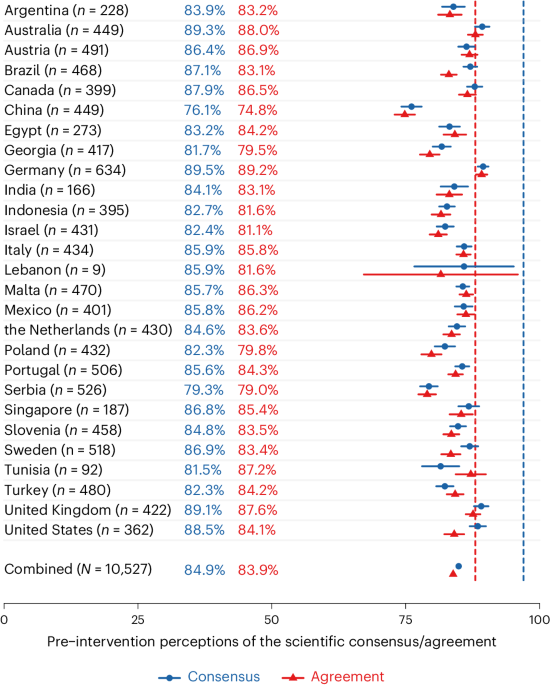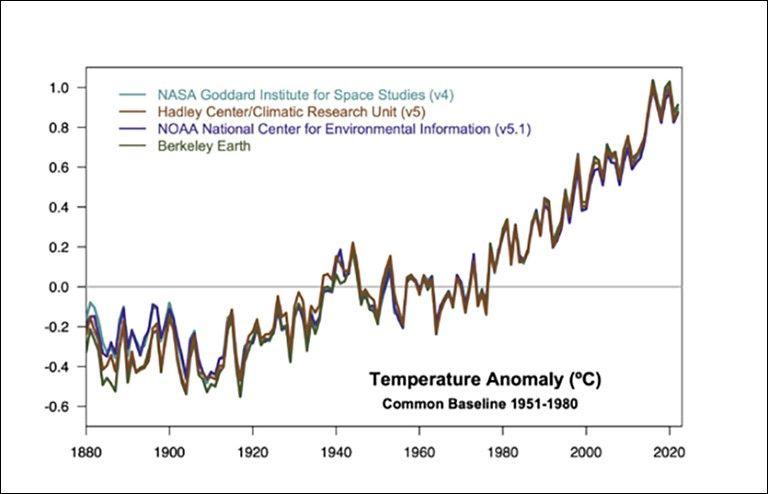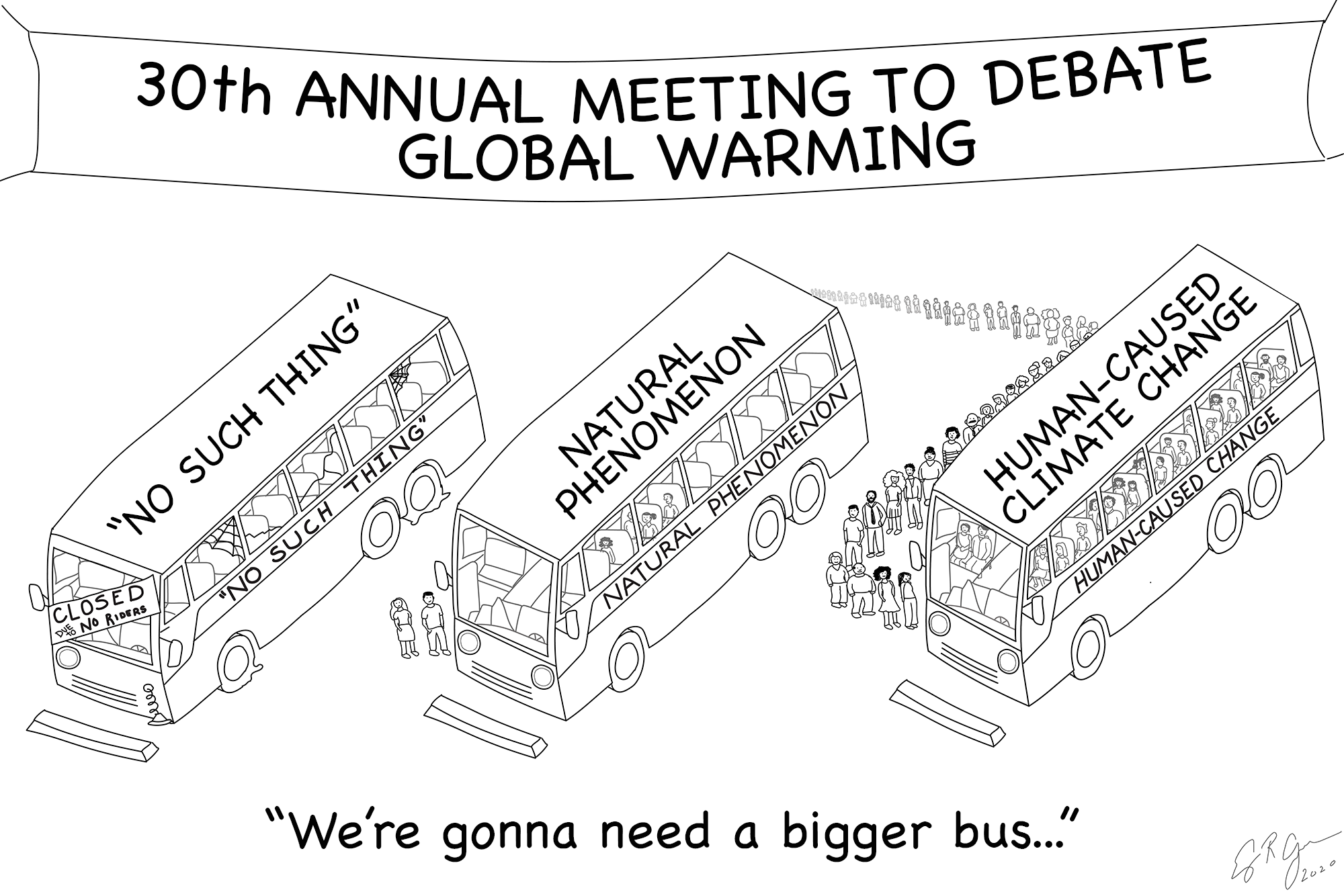- Joined
- Jul 15, 2021
- Messages
- 655
- Reaction score
- 299
- Location
- Florida
- Gender
- Male
- Political Leaning
- Progressive
Let's, first of all, make clear what a scientific consensus is. It's not, as some people think, an agreement of opinions, or an agreement among scientists. A scientific consensus is an agreement among peer-reviewed studies! In science, what scientists opine is irrelevant. The only relevant thing is what they can prove. And the ONLY way in which scientists can PROVE anything is through studies that undergo a proper peer-review process and are published.
What specifically does the consensus say? The consensus is simply this: that the surface temperature of the planet is increasing at an unprecedented rate. And that the cause of this is human activity. It is also considered part of the scientific consensus that the consequences of this will be very negative to humans and maybe even human civilization unless extraordinary steps are taken to mitigate the effects. This is usually referred to as Anthropogenic Global Warming or AGW for short.
Now, let's be clear about one thing. This thread is NOT about Climate science. This paragraph will be. But only to clarify. I'm sure there are many other threads where you can discuss climatology. Not this one. This is about the epistemological aspects of AGW. ALL the science we need is either compiled or referenced on the IPCC website: https://www.ipcc.ch/ There you can find access to over 125 years of climate science.
Ok. So let's talk about the AGW consensus. As I said, the peer-reviewed papers don't have to be unanimous. But it has to be very NEAR unanimous. In over 125 years, there are obviously papers that contradict the consensus. However, in the last 25 years (more or less) there hasn't been ANY that contradict the AGW consensus. The few that there were, were removed.... mostly by their own authors.... due to methodological errors found in post-publication peer-review. Very few subjects in science enjoy such a high level of certainty. That would be in the ball-park level of Evolution, Gravitational Theory and Cell Theory... I mean, very very trustworthy.
Now.... there is no consensus as to the consequences of AGW. The consensus is that they will be dire. But not exactly WHAT they will be. There are some things that we might be seeing to which there is general agreement: more heat (and more deaths for heat-stroke), stronger hurricane activity, more insect-carried diseases, etc. But there is no consensus as to when exactly we will start seeing this. A couple of decades ago, we thought we'd start seeing them around the middle of this century. However, scientists are alarmed because it's POSSIBLE that we may be starting to see them now. We ARE seeing record high temperatures just about every year. And that is not a good sign.
From a policy point of view, some on the right have expressed belief that somebody is demanding that they do something. Relax! You don't have to do anything. I mean... it's not a bad thing to use environmentally friendly light bulbs. But that's up to YOU. What IS important is that GOVERNMENTS take action. And government action implies that YOU don't suffer. For example, by making it less expensive for you to have environmentally friendly light bulbs. But no individual is required to do anything whatsoever. The government can pressure manufacturers to do things better. But there is no recommendation by the IPCC to do anything to force individuals to do anything in particular.
So THAT is what it's about. Hopefully this helps anybody with the patience to read it to dissipate many many myths running all over the internets....
What specifically does the consensus say? The consensus is simply this: that the surface temperature of the planet is increasing at an unprecedented rate. And that the cause of this is human activity. It is also considered part of the scientific consensus that the consequences of this will be very negative to humans and maybe even human civilization unless extraordinary steps are taken to mitigate the effects. This is usually referred to as Anthropogenic Global Warming or AGW for short.
Now, let's be clear about one thing. This thread is NOT about Climate science. This paragraph will be. But only to clarify. I'm sure there are many other threads where you can discuss climatology. Not this one. This is about the epistemological aspects of AGW. ALL the science we need is either compiled or referenced on the IPCC website: https://www.ipcc.ch/ There you can find access to over 125 years of climate science.
Ok. So let's talk about the AGW consensus. As I said, the peer-reviewed papers don't have to be unanimous. But it has to be very NEAR unanimous. In over 125 years, there are obviously papers that contradict the consensus. However, in the last 25 years (more or less) there hasn't been ANY that contradict the AGW consensus. The few that there were, were removed.... mostly by their own authors.... due to methodological errors found in post-publication peer-review. Very few subjects in science enjoy such a high level of certainty. That would be in the ball-park level of Evolution, Gravitational Theory and Cell Theory... I mean, very very trustworthy.
Now.... there is no consensus as to the consequences of AGW. The consensus is that they will be dire. But not exactly WHAT they will be. There are some things that we might be seeing to which there is general agreement: more heat (and more deaths for heat-stroke), stronger hurricane activity, more insect-carried diseases, etc. But there is no consensus as to when exactly we will start seeing this. A couple of decades ago, we thought we'd start seeing them around the middle of this century. However, scientists are alarmed because it's POSSIBLE that we may be starting to see them now. We ARE seeing record high temperatures just about every year. And that is not a good sign.
From a policy point of view, some on the right have expressed belief that somebody is demanding that they do something. Relax! You don't have to do anything. I mean... it's not a bad thing to use environmentally friendly light bulbs. But that's up to YOU. What IS important is that GOVERNMENTS take action. And government action implies that YOU don't suffer. For example, by making it less expensive for you to have environmentally friendly light bulbs. But no individual is required to do anything whatsoever. The government can pressure manufacturers to do things better. But there is no recommendation by the IPCC to do anything to force individuals to do anything in particular.
So THAT is what it's about. Hopefully this helps anybody with the patience to read it to dissipate many many myths running all over the internets....






